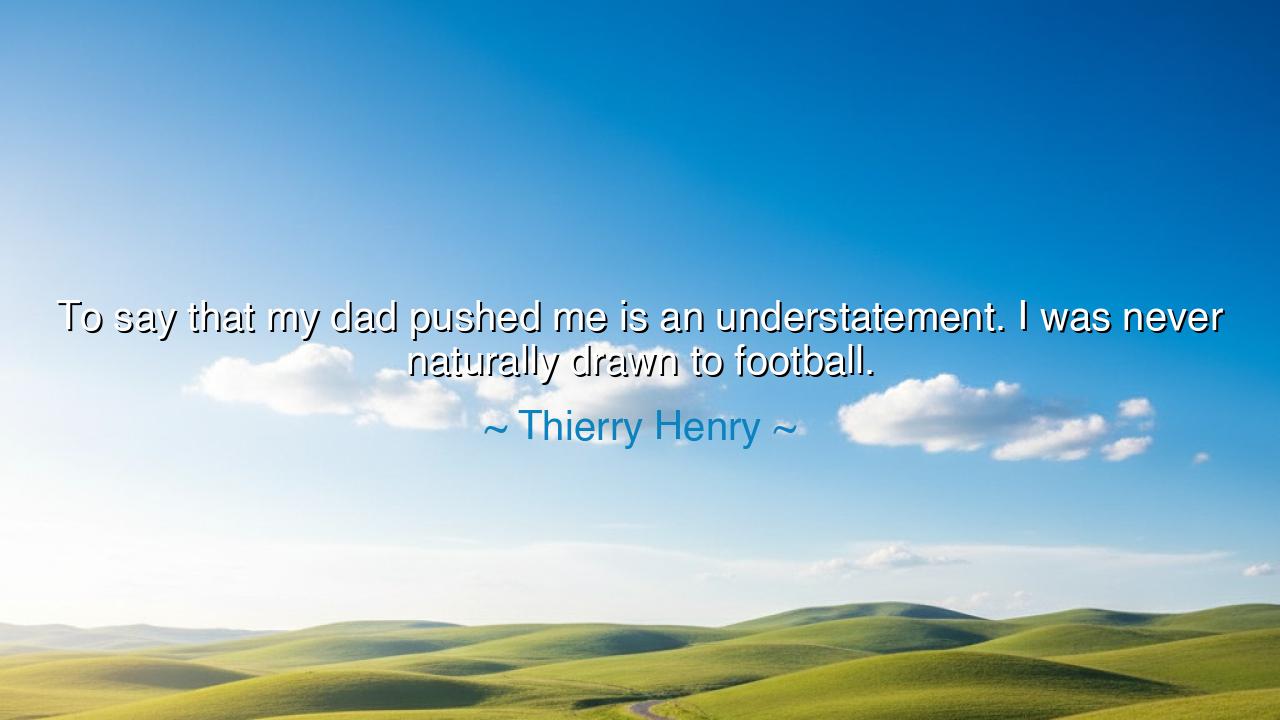
To say that my dad pushed me is an understatement. I was never
To say that my dad pushed me is an understatement. I was never naturally drawn to football.






The words “To say that my dad pushed me is an understatement. I was never naturally drawn to football,” spoken by Thierry Henry, reveal a truth as old as time — that greatness is often born not from desire, but from discipline. Beneath the calm confession lies a story of struggle, pressure, and transformation, a story that reminds us that destiny is not always chosen, but sometimes forged by the will of others. Henry’s words are not a complaint, but a meditation on the mysterious path by which talent becomes purpose. His father’s relentless push was not gentle guidance but a forge, and in that forge, the uncertain boy became the master of his craft, the artist of the field.
To be “pushed” is to be forced beyond comfort — to be made to face the pain that precedes progress. The ancients knew that the road to excellence was never easy or self-directed. The poet must suffer the discipline of words; the warrior must endure the weight of armor before he learns the joy of victory. Henry’s father, Antoine Henry, saw in his son something the boy himself could not yet see — the seed of greatness buried beneath reluctance. Like a blacksmith hammering metal into form, he struck again and again, shaping not only the athlete but the man. The son’s resistance was real, but so was the father’s vision. From that tension — between love and expectation — emerged one of the finest players the world has ever seen.
There is a paradox in Henry’s statement: that one can become great in something one did not love at first. The ancient philosophers taught that true mastery begins not in passion, but in habit. Love follows discipline, not always the other way around. Just as a sculptor grows to love the marble he once cursed for its resistance, so too does the reluctant student come to love the art he once dreaded. Henry, in his youth, did not feel the fire of football; yet through persistence and repetition, through the unyielding will of his father, he discovered a deeper form of passion — one rooted not in excitement, but in purpose. The man who was “never naturally drawn” became the man who could not live without the game.
Consider the story of Michelangelo, who, as a boy, was sent by his father to apprentice under a stonecutter, a trade thought beneath their family’s dignity. The boy despised the toil and dust. Yet through that very labor — through chisel, bruise, and dust — he found the divine in marble. The father’s insistence, like Henry’s, was not cruelty but foresight. Many who are pushed resist; few who persevere regret it. For often it is the hand that pushes us forward that awakens the greatness sleeping within.
And yet, there is tenderness in Henry’s memory — the awareness that ambition and love often wear the same face. To a child, the push feels harsh; to the adult, it becomes a gift. In later years, Henry would speak not of resentment but of gratitude, recognizing that his father’s drive had not been for glory, but for growth. His success — his precision, his elegance, his dominance on the field — was not only his own doing, but the legacy of that paternal fire. It is the eternal story of the mentor and the disciple, of the parent who believes even when the child does not, of the seed that must be forced into the soil before it blooms.
In this quote, Henry also reminds us of the burden of expectation — that the road to greatness is often paved with the dreams of others. There is a quiet weight in his words, an acknowledgment that his father’s will shaped his path long before he could choose it himself. Yet within that weight lies transformation. What begins as pressure can become purpose; what starts as someone else’s dream can evolve into one’s own destiny. The ancient Stoics would have called this the alchemy of will — the power to turn obligation into meaning, and resistance into strength.
So let the lesson of Henry’s story be this: sometimes life pushes us before we are ready, and that push, though it feels like force, is the beginning of greatness. Not every calling begins with love; some begin with labor. The father’s push, the mentor’s demand, the discipline we resist — these are the chisels that carve our character. One day, like Henry, you may look back and see that what once felt like pressure was actually providence. Therefore, when life demands more of you than you wish to give, do not shrink away. For the unseen hand that pushes you may be guiding you toward the purpose your heart has not yet learned to desire.






AAdministratorAdministrator
Welcome, honored guests. Please leave a comment, we will respond soon